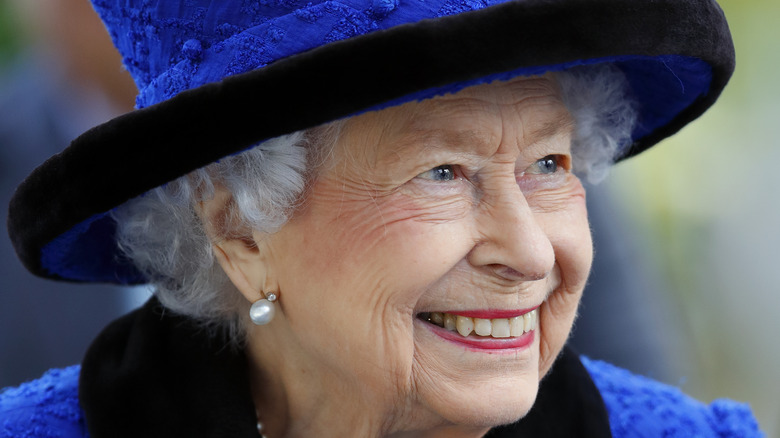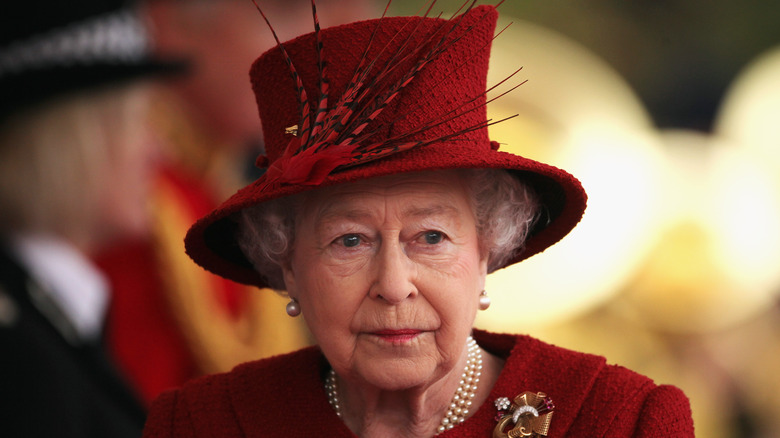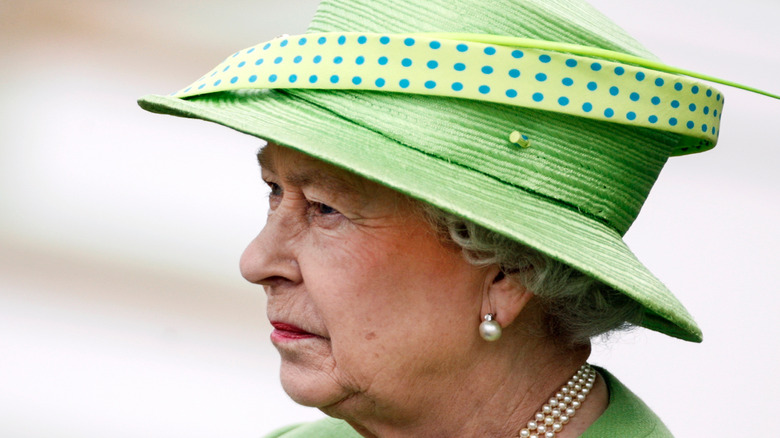Here Is How The World Will Really Learn About Queen Elizabeth's Death
The last time the monarch of Great Britain died was on February 6, 1952 (via History) with the passing of King George VI. Upon his unexpected death, even though her coronation wouldn't be until June 1953, his daughter became queen. Queen Elizabeth II became queen before she even knew it in a way; as viewers of Netflix's "The Crown" know, she and her husband were at a game viewing lodge in Kenya on a royal tour, per The Independent. The queen didn't find out about her father's death right away; it took several hours. They were in a remote location, and while a telegram was sent with the news to the Government House in Nairobi, there was a delay in decoding it, according to The Telegraph. Eventually, she was told the sad news from her husband Prince Philip. Jim Corbett, a British hunter staying at the same Kenya game lodge, wrote in the guest book: "For the first time in the history of the world, a young girl climbed into a tree one day a Princess and after having what she described as her most thrilling experience she climbed down from the tree next day a Queen."
Queen Elizabeth has been Britain's monarch for over 70 years; an unprecedented reign that was celebrated with much fanfare during the 2022 Platinum Jubilee. The British National Anthem includes the line, "Long live our noble queen," but there will be a day when Queen Elizabeth passes away. Here's how we'll find out.
Notification of the queen's death will be posted to the Buckingham Palace gates
No longer in the era of the telegram and radio broadcast, learning about Queen Elizabeth's death will happen faster than the last time a monarch passed away. This isn't something that is left to chance, carefully laid out and coordinated plans are in place — even "The Crown" has plans for Queen Elizabeth's death. The codename for the government's plan for when the queen dies is reportedly called Operation London Bridge (via Politico). A series of secure calls from the queen's private secretary will go out, starting with the prime minister and other senior members of the cabinet; the code phrase is alleged "London Bridge is down." As the word spreads amidst the government, flags will be lowered to half-mast.
The world will officially find out when it's announced to the Press Association and international media, and at the same time, a footman will post a notice to the gates at Buckingham Palace, according to The Guardian. That notice will also be the only thing on the palace website. For those checking social media, all U.K. government pages will change the profile pictures to the applicable departmental crest and feature a black banner, per Politico.
Media outlets have a plan for Queen Elizabeth's death
The British media has practiced what they'll do once they learn the queen has died. The BBC reportedly rehearses for it once a year, according to The World. The "radio alert transmission system" at BBC is a cold war-era alarm used for notification of the death of a senior royal, per The Guardian. One BBC editor said that he and other senior BBC editors would say/think: "Please God. Don't let it happen on my shift."
BBC isn't alone in having a plan in place. Media outlets will have an obituary published quickly, and tributes will be ready to go. The Times apparently has 11 days worth of coverage ready to go, via The Guardian. This works out well as the funeral is said to be 10 days after her death, as Politico reported. British radio stations have a set of "obit lights" that upon lighting up, DJs will know to expect some big, potentially sad news shortly, and they'll play inoffensive music until the news is ready to announce (via Vulture).
It will be a time of national mourning. Royal biographer Penny Junor told Town & Country the deep impact Queen Elizabeth's death will have: "The Queen is such a tremendously popular figure and during the course of her reign, so much has changed so dramatically. [. . .] The one constant in the midst of this has been the Queen, the rock solid thing we can hang on to."


